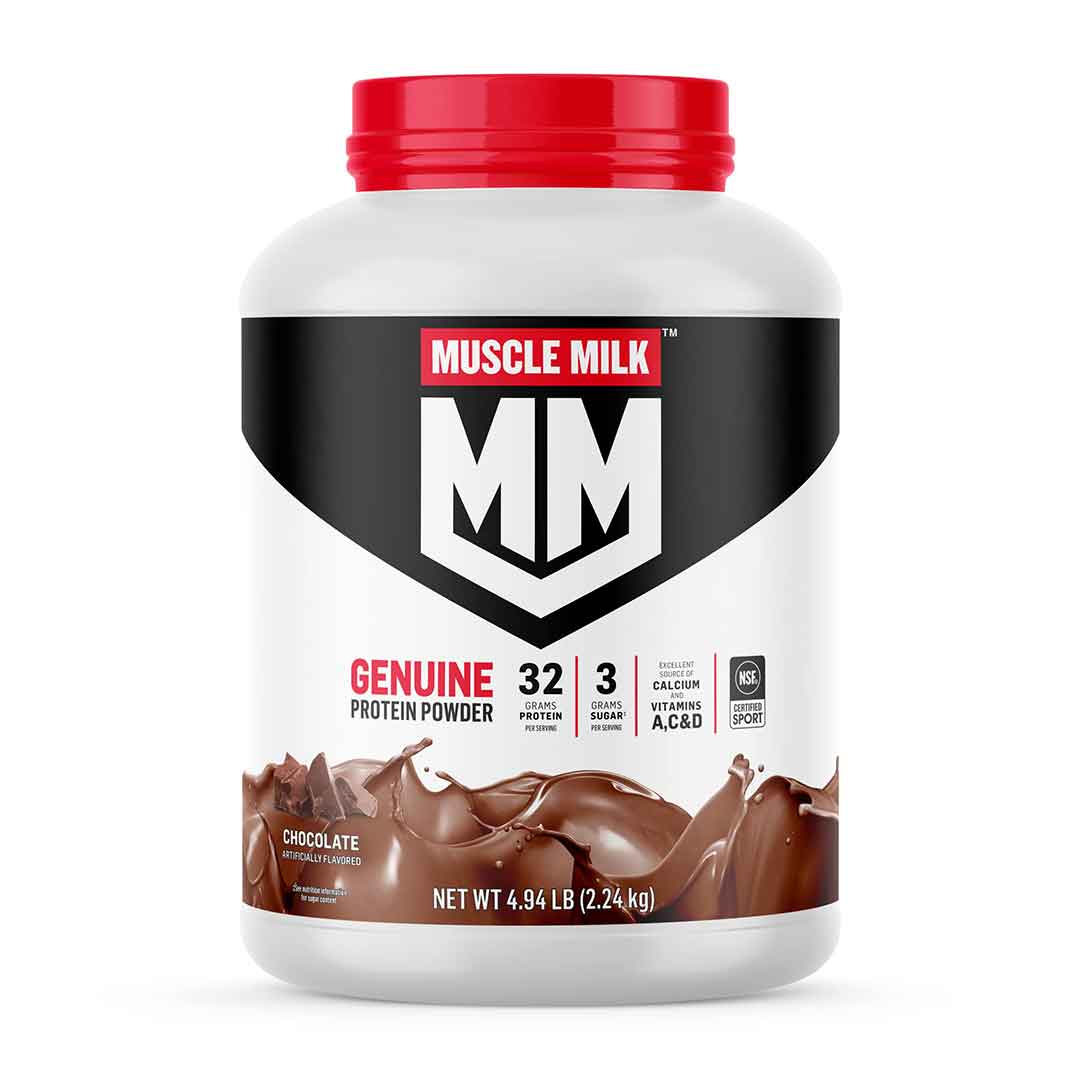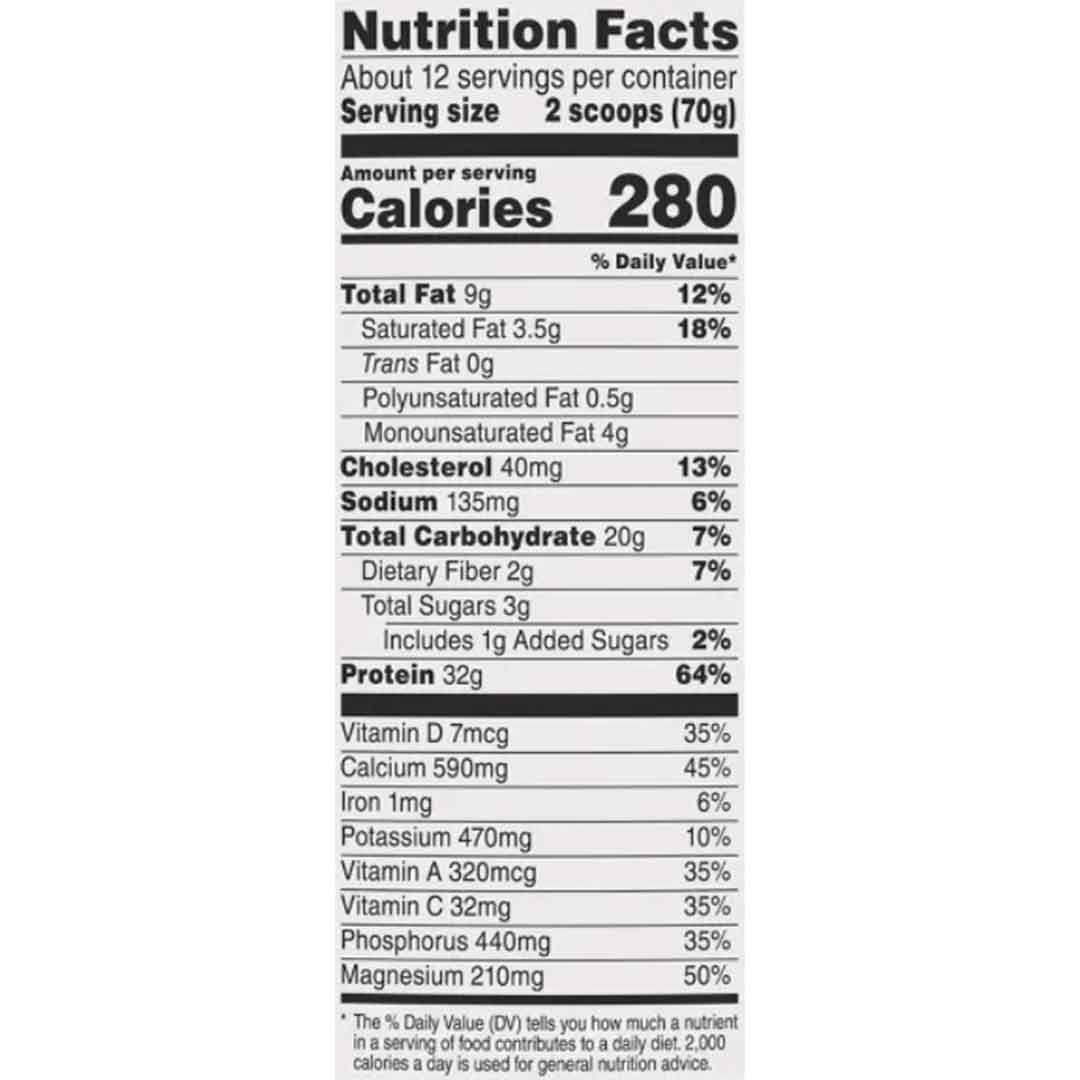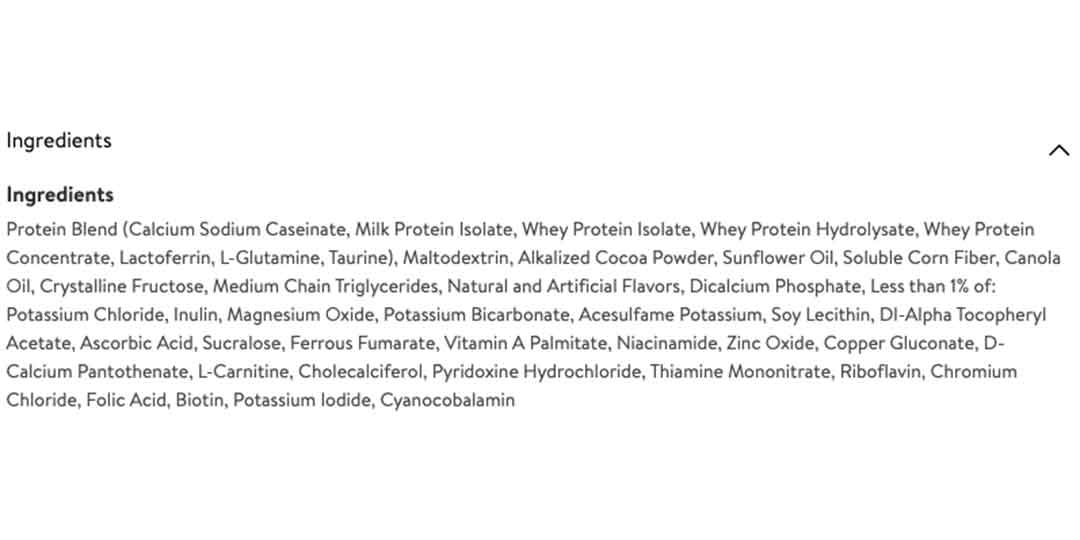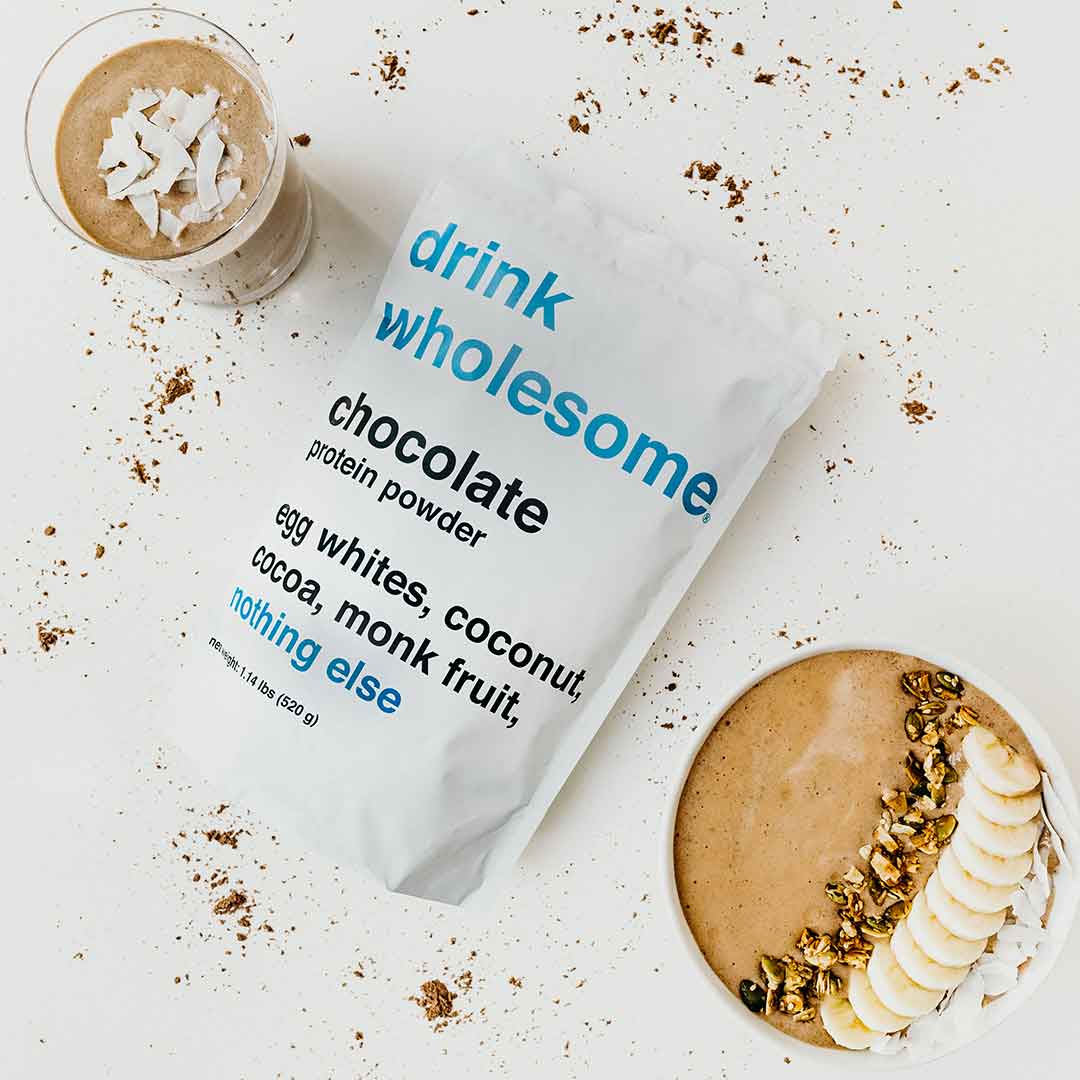Muscle Milk Review
Written by Jack Schrupp and reviewed by Ella McGonagle, M.S. Nutrition
This in-depth Muscle Milk protein powder review covers the ingredients, Nutrition Facts, and much, much more. Find out whether or not Muscle Milk protein powder is right for you.

An in-depth review of Muscle Milk.
Muscle Milk Nutrition Facts
Muscle Milk ingredients
Muscle Milk taste and texture
Muscle Milk vs drink wholesome
Muscle Milk Nutrition Facts
Muscle Milk makes several different types and flavors of protein powder. For the sake of simplicity, I am going to review their best-selling Chocolate Genuine Protein Powder.
Muscle Milk protein powder is a nutritional supplement, so I am going to start my Muscle Milk review with the Nutrition Facts. 1 serving of Muscle Milk Chocolate Genuine Protein Powder contains 280 calories, 9g of total fat, 20g of total carbohydrates, 3g of sugar, and 32g of protein.
From a nutritional standpoint, Muscle Milk protein powder look more like a meal replacement than a protein supplement. Most protein supplements, because they are made with protein concentrates and isolates, contain protein and virtually nothing else. Muscle Milk, on the contrary, contains lots of fats and carbs. It also has 280 calories per serving, making it one of the highest calorie protein powders I have ever seen. To be fair, there are 32 grams of protein in a serving, which is also well above average for a protein powder, but 280 calories is a lot. If you were to blend Muscle Milk protein powder with a cup of milk and a banana, you would easily hit 400 calories. That is a meal, not just a protein boost.
Overall, 1 serving of Muscle Milk Chocolate Genuine Protein Powder can definitely help you boost your protein intake. It may contain too many calories, fats, and carbohydrates for some people, but having a balanced nutritional profile is by no means a bad thing. If you are looking for a filling, post-workout recovery drink, Muscle Milk may be a great choice. That said, the Nutrition Facts are only the tip of the iceberg when it comes to protein powder. In order to understand if a protein powder is actually good for you, you also have to look at the ingredients.

Muscle Milk ingredients
The ingredients list is by far the most important indication of whether or not a protein powder is good for you. Generally speaking, you want a short list of simple ingredients, the fewer the better. There are over 30 ingredients in Muscle Milk Chocolate Genuine Protein Powder, so we are not off to a good start.

whey and casein protein
The first ingredient in Muscle Milk protein powder is a Protein Blend consisting of Calcium Sodium Caseinate, Milk Protein Isolate, Whey Protein Isolate, Whey Protein Hydrolysate, Whey Protein Concentrate, Lactoferrin, L-Glutamine, and Taurine. You may not recognize these ingredients, so allow me to explain what they are and how they are made.
First of all, whey and casein are the two main types of protein found in cow’s milk. Calcium Sodium Caseinate, Milk Protein Isolate, Whey Protein Isolate, Whey Protein Hydrolysate, and Whey Protein Concentrate are just different forms of whey and casein.
Calcium Sodium Caseinate, the primary source of protein, is a casein protein. Milk Protein Isolate contains both whey and casein proteins. Whey Protein Isolate, Whey Protein Hydrolysate, and Whey Protein Concentrate are whey proteins. Whey protein concentrate contains 70-80% protein (the remaining 20-30% is made up of fat and sugar). Whey protein isolate undergoes additional processing, and contains 90% protein. Whey protein hydrolysate is a form of protein in which some of the amino bonds have been broken by exposure to heat, acids or enzymes, which makes it easier to absorb by the body. Each of these proteins is made by extracting and isolating protein from milk. The process typically involves the following steps:
1. Milk is pasteurized to kill harmful bacteria.
2. The fat is removed from the milk through a separation process, usually centrifugation or filtration.
3. The remaining liquid, which contains both whey and casein proteins, is acidified to cause the casein proteins to coagulate and form curds.
4. The curds are separated from the liquid using a filtration process, resulting in a protein concentrate that is high in casein.
5. The protein concentrate is treated with an alkaline solution, such as sodium hydroxide, to increase the pH and cause the remaining whey proteins to precipitate out.
6. The precipitated whey proteins are removed using a filtration process, resulting in two different protein isolates: one that is high in casein and low in whey, and the other that is high in whey and low in casein.
7. Both protein isolates are spray-dried into a powder form.
Because they contain lactose (the sugar in dairy), milk proteins like whey and casein are known to cause digestive issues, especially for people with lactose intolerance. Lactose intolerance occurs when the body does not make enough lactase, the enzyme needed to digest lactose. It is estimated that roughly two thirds of the world’s population has some degree of lactose intolerance. Moreover, milk proteins undergo so much mechanical and chemical processing that they look nothing like real food. This is a problem because the less an ingredient looks like food, the harder it is to digest (more about this later).
lactoferrin
Lactoferrin is another milk protein. It is extracted and isolated from milk just like whey and casein. Like whey and casein, it is not suitable for those with lactose intolerance.
L-glutamine and taurine
L-Glutamine and Taurine and amino acids, the building blocks of protein. Why they are added to the Muscle Milk protein blend is suspect. This looks a lot like a practice known as amino acid spiking in which supplement manufacturers increase the protein content of their products without actually using more quality protein sources. Basically, if you use quality protein sources, there should be no need to add amino acids to your protein powder.
food additives
The rest of the ingredients in Muscle Milk Chocolate Genuine Protein Powder are food additives. In this case, there are so many additives that I cannot possibly cover all of them in this Muscle Milk protein powder review. I have therefore chosen a handful to discuss.
Maltodextrin – Maltodextrin is made from starchy vegetables like corn, rice, potato, tapioca, and wheat. It is typically used as a flow or anti-clumping agent.
Sunflower Oil and Canola Oil – To replace the fats removed from the milk proteins during the extraction process, Muscle Milk adds oils to its protein powders.
Natural and Artificial Flavor – These days, many people choose to avoid artificial flavors because they know that artificial ingredients are not healthy. Most people do not know, however, that natural flavors are hardly better for you. While food manufacturers are required to disclose their ingredients, natural flavor manufacturers are not. They can add solvents, preservatives, emulsifiers, carriers and other additives to a flavor that qualifies as “natural” under current regulations.
Acesulfame Potassium and Sucralose – Acesulfame potassium (also known as Ace-K) and sucralose are artificial sweeteners.
Soy Lecithin – To put it simply, soy lecithin is a group of fatty substances derived from soybeans. It is added to foods like protein powder to improve texture, prevent separation, and improve mix-ability.
Food additives may improve characteristics like taste, texture, and shelf stability, but they can also cause uncomfortable side effects and long-term gut damage. Basically, because they look nothing like real food, food additives are hard to digest. They therefore sit in your gut for longer than food should, which gives your gut bacteria more time to eat. As they eat, these bacteria produce gas, causing bloating and stomach pain. Gas also slows colonic transit (the amount of time it takes food to travel through the colon), which can lead to constipation.
Over time, food additives can add up (especially if you drink a protein shake every day), and disrupt regulatory pathways in the intestine. Eventually, this can lead to the development of inflammatory bowel disease (IBD) and systemic inflammatory disorders.
One additive to avoid in particular is artificial sweeteners. Artificial sweeteners are among the most harmful food additives in the long term as they alter the composition of your gut microbiota. This can lead to serious, chronic GI problems, widespread inflammation, and permanent damage to the gut microbiome.
Some sweeteners, especially sugar alcohols like xylitol, are poorly absorbed by the gut, meaning they feed your hungry gut bacteria. They can also cause diarrhea because they draw water into your intestines. Now you may finally have something to blame for those post-protein shake trips to the bathroom!
Overall, the ingredients in Muscle Milk protein powder are pretty disgusting. They hardly look like real food, and are likely to upset your stomach and damage your gut.
Muscle Milk taste and texture
Taste is so subjective that I hesitate to include it in this Muscle Milk review. A protein powder that one person loves might make another person gag, so if you read product reviews on Amazon, you will find both 5 star reviews and 1 star reviews of the same exact recipe. For the sake of this Muscle Milk review, however, I will share my thoughts on how Muscle Milk tastes and mixes.
Muscle Milk Chocolate Genuine Protein Powder has a surprisingly smooth texture, and mixes well with both water and milk. I mixed it in a shaker bottle, and did not notice any clumps or grit.
The flavor, on the other hand, left a lot to be desired. It is way too sweet in my opinion, and has an unpleasant aftertaste. In order to stomach a full serving, I would definitely have to blend it with other ingredients.
Plenty of people seem to like Muscle Milk, so take my opinion with a grain of salt. I did not care for the taste, but taste is terribly subjective. Who knows, you may love it.
Muscle Milk vs drink wholesome
Muscle Milk is a popular protein powder intended to help people achieve their wellness goals. It is cheap, widely available, and comes in a number of different flavors. As you just learned, however, it is not good for you. Its biggest weakness, which is a weakness for most protein powders, is that it is so processed that it hardly resembles real food.
This is the point in the article where I shamelessly pitch my own protein powder company, not because I just want to sell you something, but because it is hands down a better-for-you alternative to Muscle Milk. Hi! My name is Jack, and I am the founder of drink wholesome. A few years ago, I was sick and tired of protein supplements that upset my stomach, so I made my own with simple, real food ingredients.
Instead of protein concentrates or isolates, I use egg whites and almonds. Egg whites are simply pasteurized and dried before becoming protein powder. Almonds are just roasted, pressed, and ground. Minimally-processed ingredients like these are a gut-friendly, natural alternative to protein concentrates and isolates.
Moreover, unless you have a sensitivity or allergy to eggs, egg white protein is the best protein for your gut. Egg whites are low in fiber, low-FODMAP, and naturally alkaline. Our customers have experienced fewer digestive issues with egg white protein than with any other type of protein. If you cannot eat eggs, our almond protein powder is easy to digest too, and a great option for vegans.
Muscle Milk Chocolate Genuine Protein Powder ingredients:
Protein Blend (Calcium Sodium Caseinate, Milk Protein Isolate, Whey Protein Isolate, Whey Protein Hydrolysate, Whey Protein Concentrate, Lactoferrin, L-Glutamine, Taurine), Maltodextrin, Alkalized Cocoa Powder, Sunflower Oil, Soluble Corn Fiber, Canola Oil, Crystalline Fructose, Medium Chain Triglycerides, Natural and Artificial Flavors, Dicalcium Phosphate, Less than 1% of: Potassium Chloride, Inulin, Magnesium Oxide, Potassium Bicarbonate, Acesulfame Potassium, Soy Lecithin, Dl-Alpha Tocopheryl Acetate, Ascorbic Acid, Sucralose, Ferrous Fumarate, Vitamin A Palmitate, Niacinamide, Zinc Oxide, Copper Gluconate, D-Calcium Pantothenate, L-Carnitine, Cholecalciferol, Pyridoxine Hydrochloride, Thiamine Mononitrate, Riboflavin, Chromium Chloride, Folic Acid, Biotin, Potassium Iodide, Cyanocobalamin
drink wholesome is additive-free and dairy-free, which is great news for your gut. The “gut,” also known as the gastrointestinal (GI) system, is made up of several organs including the stomach, small intestine, large intestine, and colon. The term “gut microbiome” refers to the microorganisms living in your intestines, and the term “gut health” describes the function and balance of these organisms. You may not have known that the gut does much more than just help you to digest food. It also protects against pathogens, educates the immune system, and affects directly or indirectly most of our physiologic functions.
Several recent studies have examined the role of the gut in diagnosis, prognosis, and treatment of a variety of diseases, and have concluded that it plays an integral role in overall health. Given the importance of gut health, you should consider the ways in which the foods you eat affect it. You should also consider the potentially enormous impact that protein powder can have on your gut microbiome. Protein powder is not just any food, it is a food that you probably consume regularly, if not daily.
★★★★★
“I’ve had Crohn’s disease for 20+ years and it’s always been hard to find a protein powder my stomach can handle. I’ve had no problem digesting drink wholesome AND it tastes great. I highly recommend this protein powder if you have IBS or Crohn’s.” – Jesse
Read more reviews or take the quiz.
Muscle Milk review.
This content is not intended to be a substitute for professional medical advice, diagnosis, or treatment. drink wholesome is not intended to diagnose, treat, cure or prevent any disease.



